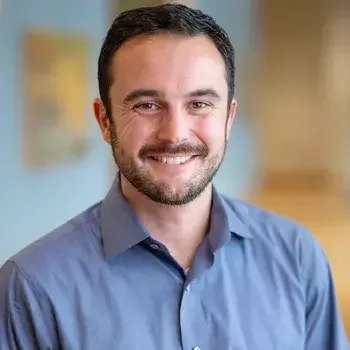Dr. Erik Helzer
Co-Director of the Veterans to Executives Transition (VET) Academy at Johns Hopkins University's Carey Business School
Podcast Episode Coming Soon
Beyond the Article: Hear the full exclusive interview with Dr. Erik Helzer, Co-Director of the Veterans to Executives Academy on the VCEO Podcast. Discover how Johns Hopkins University is bridging the gap for Veterans into executive business roles.
How America’s First Research University Is Transforming Service Members Into Business Executives
Privilege, Service, Value, Commitment, Transformation, Right

From the Battlefield to the Boardroom
Practical wisdom is the capability to apply the correct ethical behavior, knowledge, and agency at the right place and at the right time. Military leaders are tasked to make immensely important decisions that, more often than in any other career, involve life-and-death situations. For many service members, this unparalleled experience makes them excellent candidates for senior leadership roles outside the military. However, before a Veteran can thrive in the C-suite, they must first learn how to translate their practical wisdom from the battlefield to the boardroom.
Dr. Erik Helzer, Co-Director of the Veterans to Executives Transition (VET) Academy at Johns Hopkins University's Carey Business School, combines his experience leading the Executive Education Leadership Curriculum with his background in teaching at the Naval Postgraduate School. This unique perspective allows him to help Veterans maximize their civilian careers in senior leadership by developing a program focused on three essential goals: Bridging the Gap, Building a New Network, and Forcing a New Professional Identity.
Bridging The Gap From Commander To CEO
The transition from senior leadership in the military to senior leadership in civilian companies is more than a job change, stresses Dr. Helzer; it's a transformation. Some skills are easier to translate than others. For instance, managing a multi-million-dollar budget in the military differs from working in a for-profit environment. Still, this difference can often be bridged through business finance literacy, while maintaining many similarities between the two. Other skills, like negotiation, may require more effort to develop. The structured nature of the military creates fewer opportunities to negotiate on things that are common in the civilian world.
Aside from addressing knowledge gaps, Dr. Helzer and the VET Academy also aim to tackle the massive shift in social networks, as well as the socio-emotional gaps that arise upon separation. Through the VET Academy’s strong network of connected employers, Dr. Helzer is able to successfully provide crucial connections outside of military and government networks, which are vital for thriving in the career transition. Dr. Helzer notes that while hanging up the uniform can be an emotional period for a Veteran's identity, it is also an opportunity to create a new professional identity that takes all the best attributes from decades of military service and transforms them into a unique professional identity.
Executive Opportunity: A Commitment to Veterans
Dr. Helzer designed the VET Academy as a 10-day intensive cohort program to help address one of the most unique gaps in professional careers: shifting from a known military path to an unknown civilian landscape. Most people will transition into something they are familiar with, but there is also a vast opportunity to apply their leadership skills in an entirely new area. "It’s the world where you don’t know where the realm of possibility exists,” says Dr. Helzer. "The only way for this to happen is through exposure or through the school of hard knocks.”
Designed to deliver crucial exposure and bridge the gaps between military and civilian careers, Dr. Helzer notes that the VET Academy is demonstrably not a "one-and-done" kind of organization. Veterans who participate in the program not only have the opportunity to explore how their background and skills can be an asset in the civilian job market, but they also have access to resources developed through Johns Hopkins' cultivated relationships and commitment to service members. Participants gain access to professional coaches, career resources, and a supportive network of alumni and employers, a privilege of the program intended to support ongoing growth and adjustments.
In closing, Dr. Helzer encourages Veterans to be open to growth and exploration, noting that it’s okay to experiment with early roles. “The world is your oyster, and you have the burden of choice, which is a big thing to do,” says Dr. Helzer. “What we want to be able to do is to expose folks to the experiences and knowledge and people who can help them make that next right decision.” By combining practical wisdom with business literacy and connecting Veterans with employers seeking unique leadership qualities, Dr. Helzer and the VET Academy aim to empower both Veterans and employers with the tools needed to build the next generation of executive leaders.
Tapping Into Hidden Value: The ROI of Hiring Veteran Leaders
After service, finding the right job that leverages a Veteran’s years of experience is a challenge for both the individual and the employer. Dr. Helzer emphasizes that companies should view Veterans as a strategic investment with a profound return on investment (ROI) because many Veterans have already spent a career honing the specific leadership skills that companies desire. “The return on investment has to do with the performance and the ownership over the work they're doing, but it also has to do with their impact on peers and the organization's culture, ethics, and character,” he states.
Dr. Helzer notes that maximizing this ROI requires Veterans first to identify work they are passionate about, ensuring they can bring lasting value. "One of the things we know from the research we've done in setting up this academy is that the challenge isn't always finding that first job out of the gate," Dr. Helzer explains. Often, service members will find jobs that may seem like the obvious next step but fail to utilize all their skills. To prevent this, Dr. Helzer and the VET Academy provide a program that enables Veterans to explore career opportunities, recognizing that the first civilian job might be a necessary step or two down from their ultimate goal.
"When I say the word right, I mean it in two senses," says Dr. Helzer. "One is, 'What is the right fit for service members that uses the skills and abilities they have?' But I also mean right in the area of ethics."
By aligning the right service member with the right skills and the right moral character, companies can attract leadership that helps foster other intangible qualities beyond the bottom line, such as team building, influencing future leaders, and upholding the organization's character.



